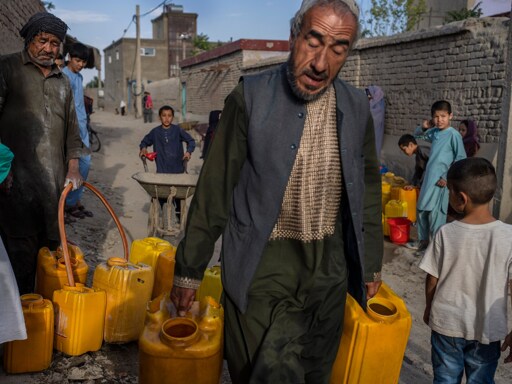Kabul, a city of over six million people, could become the first modern city to run out of water in the next five years, a new report has warned.
Groundwater levels in the Afghan capital have dropped drastically due to over-extraction and the effects of climate change, according to a report published by nonprofit Mercy Corps.



Uh… Yeah, bombing weddings day in and day out didn’t endear the West much to Afghans. How is that a surprise? Had Afghanistan not been invaded by America and co. in 2001, they’d have had 25 years od government experience to deal with this crisis, so Western imperialism is to blame for this.
Reading the article, it seems capitalism is the cause rather than imperialism past or present. Especially considering the Taliban were in charge in 2000 as they are today, could you explain how the situation would be meaningfully different without the (admittedly stupid) western military escapade? Would Talib like money less than they do today?
Can you quote the part of the article that made you think so?Edit: Found it, but that’s presented in the article as a secondary cause. Because the main causes cited in the article are climate change, the impact of the war and sanctions, but that aside;As we’ve seen these past few years, the Taliban obviously have no idea how to run a country. They would’ve never lasted as long as they have in peacetime; it was the US invasion that sustained them all these years. Without that they’d have either grown into a competent-ish government in time to tackle the current crisis or been overthrown by a more competent faction. They also had real military opposition in the form of the North Afghanistan Alliance, which was coopted and ran into the ground by the West following the invasion, so now the Taliban are governing unopposed during a time of crisis that requires a competent and timely response. The US invasion stole 20 years from Afghanistan where they could’ve otherwise started to get their bearings as a modern state. And also, as the article states, Kabul’s population only got this big as a result of the war making the countryside less safe.
Clearly the soda company and the rich still have water, so I’d hardly say it’s a “secondary cause”, but anyway, even taking all you’ve said as true, that still doesn’t explain why the west should get involved here. What would we even do? Occupy the soda factory and give free bottles to everyone?
I’ve tried nothing and I’m all out of ideas!
Please never pursue politics or sociology as a career.
For humanitarian reasons and because most of the origins of this crisis are Western-caused.
for starters suspend sanctions, at least partially, so international aid, funding and expertise can enter the country. Then fund projects that could help avert the crisis.
In the first place the sanctions on Afghanistan are only going to be counterproductive. The people of Afghanistan need to develop economically before they can have political ambitions; the longer they’re kept in poverty the longer the Taliban will remain in power.